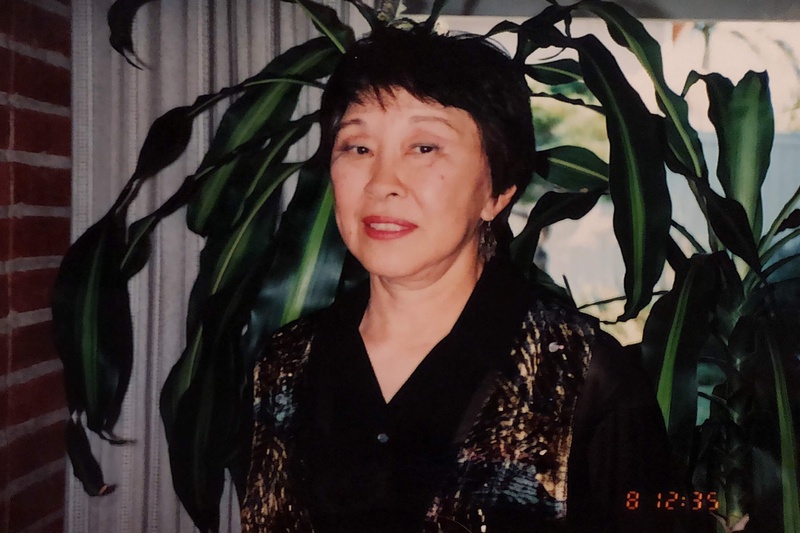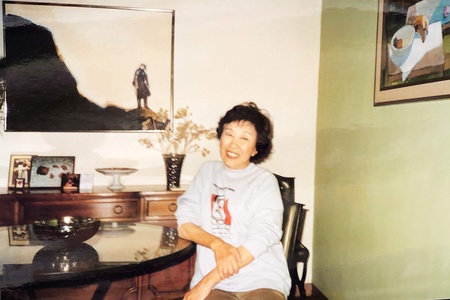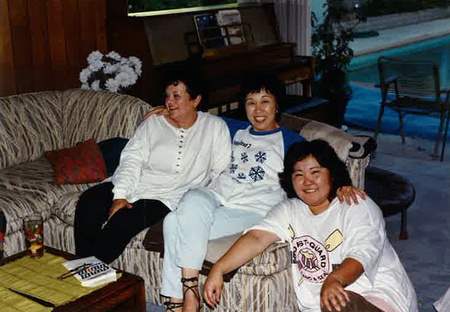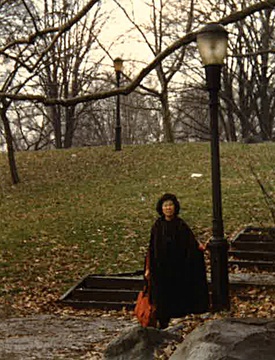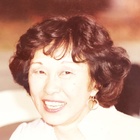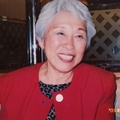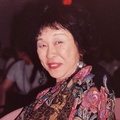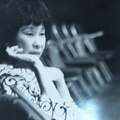What may be most notable about The Memento is what it reveals of the author herself, about her own emotional and spiritual life. It is here where I wish to step away from the writer and talk about the person whom I grew to know so well over many decades. I can easily infer that she, too, felt spurned by a man she had loved. Not only did her husband Chester divorce her after their nearly 30 years together, but he soon remarried, this time to a much younger Japanese woman, with whom he had two more children. Their conflicts continued well after their divorce, as illustrated by the following passage from one of Yamauchi’s letters from the early ’80s:
“I had another fight with Chester. He inadvertently revealed that his wife has a new Toyota. It was in an accident at Tioga Pass (a family vacation trip) and was left for repair in a small town. I was furious. Never mind the accident. Last year, a new Buick, a trip (wife and kids) to Japan, a new van for his business and now a new Toyota before he pays me back!
I told him I felt like I’d been shafted. / Shafted! he says. Who’s been shafted? I should have done like my lawyer advised and paid only for eight years; I’d be through by now. My wife feels like SHE’S been shafted, he says. / Never mind her. You called the shots in that divorce BEFORE she married you. She knew the situation, and of course, you’ve told her about all the loans I’ve made to you. / Well, she HAD to get a new car; the old one wasn’t safe for the kids. / You think your kids have a priority on safety? I’d like to be safe, too. I could buy a car if you paid me back. / Well BUY a car; you can afford it. / How much money do you think I have? / Well, go to work then. / Why should I? / Well, my wife works at our office. / Don’t talk to me about her or your kids. That’s YOUR responsibility. / Don’t you tell me what to talk about! / (ha ha, I knew I got him backed up then)…
And he thinks he’s a nice man. He sits up at my counter and sips my tea and tells me (modestly examining the tea leaves) how so and so and so and so have remarked what a kind, feeling, intelligent man he is. I want to tell him, don’t believe them! You’re NOT a nice man. And your wife is mean and grasping, too. No one likes her. The Yamauchis have very little to do with her and your own friends don’t like her. You are a perfect pair. And I hope your Toyota disintegrates in Tioga Pass before you make the next payment. And I am not going to let you off the hook even when I become a millionaire. Especially. And I’m glad I don’t love you any more... And that’s the truf!”
The passage illustrates the simmering passions lying beneath the surface of this demure Japanese American woman (like Marie, the protagonist of The Memento) raised to practice shikata ga nai, Japanese for “it can’t be helped,” as applied to knowing one’s place in a rigidly patriarchal society. Here she is again in 1983, describing to me the occasion of Chester’s…
“…Kanreki, a 60th birthday party (a milestone for Japanese males, a folk custom)—big doings—everyone in town is invited but of course, the woman who once loved him, finally tolerated him, still loaned him the thousands and thousands of dollars that kept his business afloat….well, the last time I saw him (Wednesday) he was eating salad at my counter, the light shining directly overhead casting deep shadows under his eyes. I felt sad knowing how much he hated growing old and here, for all to see, HE was carting big luggage under his eyes and under his slightly receding chin. But HE didn’t know. HE couldn’t see it. So what good did it do me?
And tonight my sister…wearing my Borgesa coat and ankle strap shoes (she left her dress shoes in Santa Barbara), and her husband, my brother and his wife, everybody all gussied up, all laughing happily, drove off to the party…well, at least my coat and shoes will be there. I hope he recognizes the coat. I’ve had it that long.
If I remember, I’ll not talk to him next Wednesday. He comes over to take Joy to yoga on Wednesdays. Or maybe I’ll stuff him full of food, set him under the light bulb and enjoy his sagging jowls and hooded eyes. I think I hate him again…”
Although Yamauchi was willfully rebellious for a woman of her generation and culture, she was also torn over having failed as a traditional Japanese wife, a feeling surely exacerbated by her ex-husband’s premature death from cancer at age 69 in 1992. Her writing career, which took off after her divorce, proved a powerful antidote to the depression she experienced after Chester left her, but her loneliness never went away. As she once wrote me:
“Sundays are awful for singles. I’ve been playing a lot of gin with my brother and his wife and sometimes with their daughter (when her boyfriend is out of town). I think I’ll run out and get a box of chocolates and check out for the night. It’s a lonely life. Still I rush away from entanglements…I wanted to love and grow old with someone but … now it’s too late; there’s no growing old with anyone now.”
Understandably, she felt compelled to make a connection to a higher, spiritual power in order to meaningfully reconnect with life again. A lifelong Buddhist, she was open to non-Western religious practices and teachers, and thus responded to an ad she saw from Paul Mastorakos, a tall, bald, deep-voiced metaphysicist who, with his black assistant Hazel at his side, dressed in her flowing, turquoise-blue robe with its floral motif, delivered spiritual sermons and guided meditations at his church on the western, residential segment of Hollywood Boulevard.
I was back in Culver City having emotional issues of my own at the time (related to a messy break-up in New York and a play I was writing about my father’s death), as was my mother, whose close friend was brutally killed by an ex-con she’d been dating. It was November 1980—my mother’s friend was murdered the day after Reagan was elected—and in the aftermath of her death, I spent a week with Yamauchi and her daughter Joy in Gardena, hoping to escape some of the turmoil at my mother’s house, where friends of the murdered woman were gathering to console one another. Both Yamauchi and her daughter were supportive to a fault, and reminded me often of the healing power of time. It was not long after that Yamauchi introduced my mother and me to Mastorakos, and for months, the three of us attended his services together, repeating mantras and hoping to find a modicum of peace.
The following spring, I returned to New York City, where, in 1984, Yamauchi and my mother visited me over the December holidays, staying at the Gramercy Park Hotel on Lexington Avenue. All hotel guests received a key to nearby Gramercy Park, the only private park in Manhattan. I remember Yamauchi in her vertically striped faux-fur winter coat and her dark wool cap as we stood in the center of the park by the statue of actor Edwin Booth, discussing the defects of the latest plays and movies. At the time, Yamauchi’s younger sister Kibo—the one born in answer to her mother’s overwhelming grief—was suffering from terminal cancer, and Yamauchi had considered canceling the trip to New York. A year prior, Yamauchi had written to me:
“Today is the day my baby brother died forty-six years ago. And my little sister who now is so gravely ill was conceived to help my mother through her grief…She asked me to feel this stiffening lump in her stomach on the weekend of her daughter’s shower here in Gardena. And (my heart falling) I urged her to see her doctor. She was due for a check-up, she said, and the following week she called to tell me it was a uterine tumor. She said many women get them at menopause and it was possible hers was benign. She said I was lucky not to have had these complications in my menopause and then, her voice pitched high and fluttering, she said, ‘Oh, Wakako, I think it’s malignant.’…I spent that night and early morning crying and calling in this vacant house, invoking the name of my mother, my father and our source, asking for divine mercy…She was right. The tumor was malignant…”
My mother had persuaded Yamauchi to come to New York, given there was little she could do for her sister at that point. Yamauchi told me that her daughter Joy would only call if “something happened,” and she got that call—that Kibo had died—when we were all together in my one-room apartment at Central Park West and 107th Street. I had met Kibo once—a beautiful woman with a kind disposition—and was saddened to see Yamauchi fly home the next day, just as she had rushed by train to her father’s deathbed in Poston, only to arrive too late.
She wrote to me the following May:
“I had put off developing the roll [of film] because I couldn’t bear to see the picture I’d taken of my sister. It is her last. She wears a sad look of goodbye. The pain from the coughing is there, and the paper bag she throws her wet tissues in, and she wears the cotton skirt I bought and hemmed for her, that she had put on to please me, summoning the energy to change. She sits on the sofa, leaning back, her mouth pursed, holding the pain just below the surface, and there is the cup of soup I made for her, half-eaten, on the glass-topped table. To her right there is a folded cerise shirt I’d given her (trying to coax a smile) and to her left a box of tissues. On the floor is the paper bag, its mouth open to her expectoration… I must let her go.”
Yamauchi came out east again in the winter of 1987 for a production of her play The Memento at Yale. My partner (and eventual husband) Roberto Fradera and I took a train from Manhattan to New Haven to have dinner with her and see the play. She returned to New York City in 1990, this time for Pan Asian Repertory’s reprise production of Soul. Roberto and I met her after rehearsal at the theater on West 20th Street to again take her out to dinner, after which we escorted her to the hotel on upper Broadway where Pan Asian had arranged to put her up. When we arrived, we found a host of unusual characters inhabiting the shabby lobby, and could tell Yamauchi was a little put off, albeit trying to convince us otherwise. Unpersuaded, we didn’t even bother going up to look at the room, which, as we suspected, would be served by a bathroom down the hall. Instead, we took Yamauchi to our place in Washington Heights, and put her up there for the week or so that she had planned to stay.
In-between those two trips east, something significant came out of Washington, D.C.: the Civil Liberties Act of 1988. Nearly 50 years after the internment of Japanese Americans, the U.S. government was finally ready to apologize, admitting that the Japanese were imprisoned based “largely on race prejudice, war hysteria, and a failure of political leadership,” not national security, and that each and every American citizen and permanent resident alien interned (or their heirs, if they were deceased) would receive the sum of $20,000 in reparations. President Reagan and most of his fellow Republicans were adamantly opposed to the bill, but once it passed both houses of Congress, Reagan felt pressured to sign it.
The first payments went out in 1990, and one can only imagine how vindicating it must have been for victims like Yamauchi to receive their checks, insufficient as they may have seemed. It wasn’t until 2018 that the Supreme Court finally (almost as an afterthought in, ironically, the same decision that upheld President Trump’s travel ban on citizens of various nations) overturned Korematsu vs. the United States, the 1944 decision that declared Executive Order 9066 constitutional.
© 2019 Ross Levine


